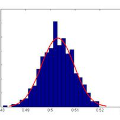Let $\mathcal{A}$ be a Las Vegas algorithm, i.e. an algorithm whose running time $T$ is a random variable drawn according to a certain probability distribution $p$. In 1993, Luby, Sinclair and Zuckerman [LSZ93] proved that a simple universal restart strategy can, for any probability distribution $p$, provide an algorithm executing $\mathcal{A}$ and whose expected running time is $O(\ell^\star_p\log\ell^\star_p)$, where $\ell^\star_p=\Theta\left(\inf_{q\in (0,1]}Q_p(q)/q\right)$ is the minimum expected running time achievable with full prior knowledge of the probability distribution $p$, and $Q_p(q)$ is the $q$-quantile of $p$. Moreover, the authors showed that the logarithmic term could not be removed for universal restart strategies and was, in a certain sense, optimal. In this work, we show that, quite surprisingly, the logarithmic term can be replaced by a smaller quantity, thus reducing the expected running time in practical settings of interest. More precisely, we propose a novel restart strategy that executes $\mathcal{A}$ and whose expected running time is $O\big(\inf_{q\in (0,1]}\frac{Q_p(q)}{q}\,\psi\big(\log Q_p(q),\,\log (1/q)\big)\big)$ where $\psi(a,b)=1+\min\left\{a+b,a\log^2 a,\,b\log^2 b\right\}$. This quantity is, up to a multiplicative factor, better than: 1) the universal restart strategy of [LSZ93], 2) any $q$-quantile of $p$ for $q\in(0,1]$, 3) the original algorithm, and 4) any quantity of the form $\phi^{-1}(\mathbb{E}[\phi(T)])$ for a large class of concave functions $\phi$. The latter extends the recent restart strategy of [Zam22] achieving $O\left(e^{\mathbb{E}[\ln(T)]}\right)$, and can be thought of as algorithmic reverse Jensen's inequalities. Finally, we show that the behavior of $\frac{t\phi''(t)}{\phi'(t)}$ at infinity controls the existence of reverse Jensen's inequalities by providing a necessary and a sufficient condition for these inequalities to hold.
翻译:令 $\mathcal{A}$ 为拉斯维加斯算法,即运行时间 $T$ 是按某概率分布 $p$ 随机抽取的随机变量。1993年,Luby、Sinclair和Zuckerman [LSZ93]证明了一种简单的通用重启策略可以为任何概率分布 $p$ 提供一个运行 $\mathcal{A}$ 并其期望运行时间为 $O(\ell^\star_p\log\ell^\star_p)$ 的算法,其中 $\ell^\star_p=\Theta\left(\inf_{q\in(0,1]}Q_p(q)/q\right)$ 是在完全知道概率分布 $p$ 的情况下可达到的最小期望运行时间,而 $Q_p(q)$ 是 $p$ 的 $q$-分位数。此外,作者还表明对于通用重启策略,对数项是无法消除的且在某种意义下是最优的。在本研究中,我们发现令人惊讶的是,对数项可以被更小的数量所取代,从而减少在实际感兴趣的情况下的期望运行时间。更具体而言,我们提出了一种新型重启策略,其执行 $\mathcal{A}$ 并期望运行时间为 $O\big(\inf_{q\in(0,1]}\frac{Q_p(q)}{q}\,\psi(\log Q_p(q),\log(1/q))\big)$,其中 $\psi(a,b)=1+\min\left\{a+b,a\log^2 a,\,b\log^2 b\right\}$。该数量在以下方面上,与:1)[LSZ93] 的通用重启策略;2)$q\in(0,1]$ 的 $p$ 的任何 $q$-分位数;3)原始算法,和4)某类凹函数 $\phi$ 的任意形式的 $\phi^{-1}(\mathbb{E}[\phi(T)])$,相比有着更好的表现。后者是[Zam22]的最近修改的重启策略,其可实现 $O(e^{\mathbb{E}[\ln(T)]})$,可被视为算法上的反Jensen不等式。最后,我们通过提供反Jensen不等式的必要和充分条件,说明了 $\frac{t\phi''(t)}{\phi'(t)}$ 在无限大时的行为,控制这些不等式的存在。




